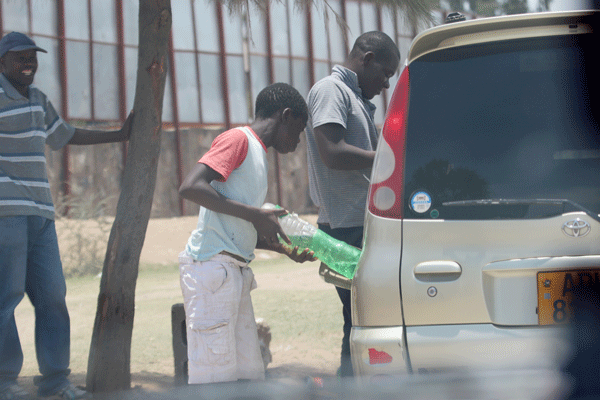
BEITBRIDGE residents have expressed concern over the increased sale of fuel smuggled from South Africa on the black market, saying authorities must put a lid on the vice.
BY OBEY MANAYITI

Smuggling of fuel in Beitbridge is so rife that most motorists now prefer to buy from the streets while shunning registered fuel service stations.
The fuel is stored in houses and sold from plastic containers, something that has led to tragic fire outbreaks at some houses in the border town.
Many people have lost their lives while others have sustained serious injuries from petrol-induced fire outbreaks. Several houses have also been damaged by petrol explosions.
Beitbridge’s town secretary, Loud Ramakgapola said they had teamed up with law enforcers to deal with the matter, but with little success.
“Petrol smuggling and resale on the black market is a very big challenge for us,” he said.
“Sometime this year, a certain woman lost her life after petrol that was stored in her house caught fire. “There are many people who have been affected by this,” Ramakgapola said.
- Chamisa under fire over US$120K donation
- Mavhunga puts DeMbare into Chibuku quarterfinals
- Pension funds bet on Cabora Bassa oilfields
- Councils defy govt fire tender directive
Keep Reading
“We have licensed service stations that pay us and the situation is not fair for them.
“We have tried to engage the Environmental Management Agency (EMA) and police on the issue.
“EMA helped us to raid those selling fuel but they are fined $20 which is not so deterrent.
“The matter is taken as petty crime but we need to seriously deal with it.”
The Standard witnessed young boys and girls running around with plastic containers selling fuel in Dulibadzimu suburb during a recent investigation of rising cases of smuggling in Beitbridge.
Some people said because of the worsening economic situation, they had to find something to do to sustain their livelihoods.
They said if the government wanted them to stop trading in fuel, there was need to finance income-generating projects.
Motorists said they would continue supporting the black market because the fuel was relatively cheaper and it lasted longer in their vehicles.
The motorists said although there wasn’t much of a difference between the black market and official fuel prices, they preferred the illegal market because the fuel bought in South Africa was relatively clean.
A fuel dealer in the border town yesterday said 10 litres of petrol cost $8 on the black market, translating to $1,25 a litre. At service stations petrol costs between $1,33 and $1,35.
Beitbridge Residents Association chairperson Lawrence Tshili said inasmuch as they wanted the black market on fuel to close, smuggling was difficult to contain.
“It is hard to eradicate such things. We have tried to talk to the people but it is hard to stop them. We have held some meetings to try to make sure police and council enforce the law, but they are also failing to control it,” Tshili said.
“We have people who lost their lives because of this. We cannot stop them because our borders are porous.”
EMA’s education and publicity manager, Steady Kangata said the issue of fuel smuggling involved many agencies who have to sit down and map the way forward.
“The issue of fuel is governed by many institutions. We will sit down to see how we can manage it,” he said.
The Zimbabwe Revenue Authority (Zimra) admitted after this paper’s exposé of the smuggling activities last week that it was facing a tough time containing the crime in Beitbridge.
While smuggling was common along the country’s porous border with South Africa through illegal entry points, the syndicates now have the audacity to transport their loot through the heavily manned Beitbridge Border Post.
At illegal entry points along the Limpopo River, the smuggling has become so rampant that some villagers have set up businesses such as shebeens and tuckshops to serve the smuggling kingpins.
Various sources told this paper that the situation worsened after the introduction of Statutory Instrument 64 of 2016 in July.
The controversial law prohibits the importation of certain goods ranging from groceries to building materials and furniture without an import licence.
Zimra board secretary and director for legal and corporate services Florence Jambwa said they were working on numerous initiatives to curb smuggling and corruption within the organisation.
According to Jambwa, some of the strategies include roadblocks in collaboration with law enforcement agencies, border patrols, post-importation audits to verify whether proper customs clearance procedures were followed and the use of non-intrusive inspection equipment (scanners) at ports of entry and exit to identify any contraband.










